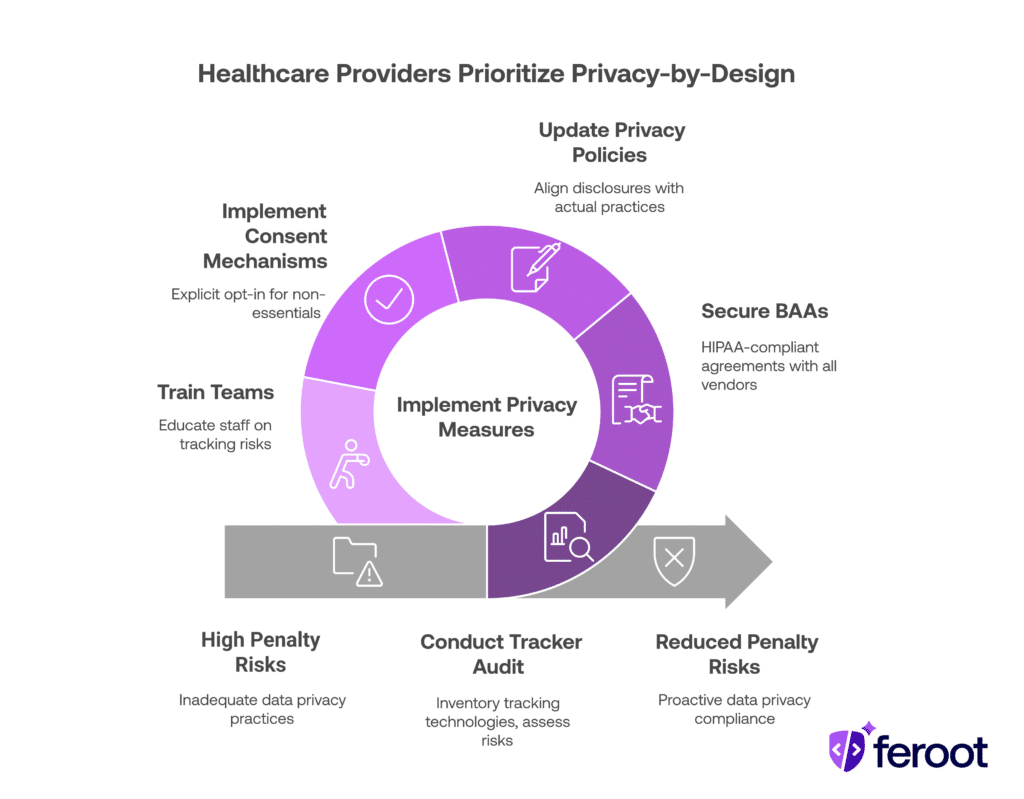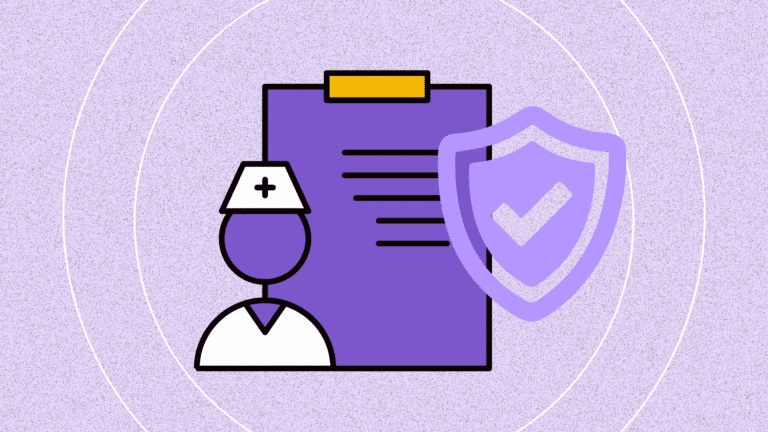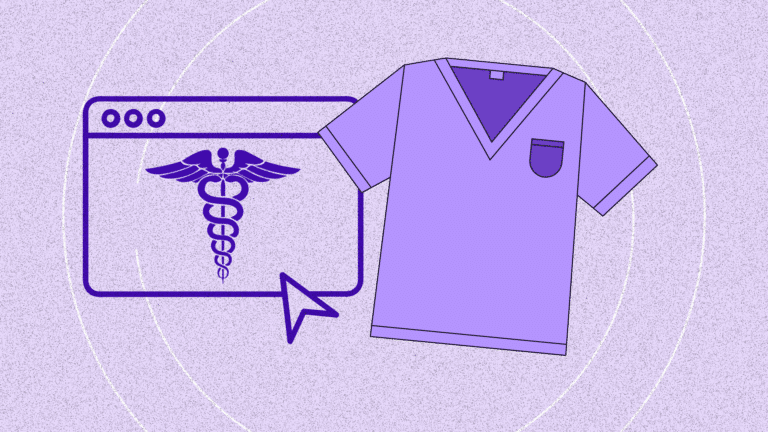TL;DR
Pixel tracking violations have cost U.S. healthcare providers over $100 million in fines, exposing critical gaps in HIPAA compliance and patient data privacy. Failures included missing risk assessments, no consent, and weak vendor oversight.
Download the Free PCI 6.4.3 and 11.6.1 Checklist
In the race to leverage digital marketing, healthcare providers have stumbled into a costly minefield: unauthorized data sharing via tracking pixels. From 2023 to 2025, hospitals, telehealth platforms, and digital health apps have paid over $100 million in penalties and settlements for privacy violations tied to these technologies. As Feroot, a leader in website cybersecurity and compliance, we’ve analyzed this seismic shift to highlight the stakes and offer a path forward for healthcare CISOs, CTOs, and compliance officers.
A $100M+ Wake-Up Call: The Penalty Landscape
Tracking pixels—small pieces of code on websites that monitor user activity—are now getting a lot of attention from regulators and legal authorities. These tools, often used for analytics or targeted advertising, have inadvertently shared sensitive patient data with third parties like Meta, Google, and others without consent, violating laws like HIPAA and the FTC Act. Our consolidated analysis of 19 unique cases from 2023 to 2025 reveals 19 unique cases totaling $100M+ of penalties.
- 2023: The Dawn of Enforcement
The year 2023 marked a turning point, with $37.15M in penalties across eight cases. BetterHelp’s $7.8M FTC settlement for sharing mental health data and GoodRx’s $25M class-action payout for exposing prescription data set the tone. Regulatory bodies like the FTC and New York Attorney General, alongside class-action lawsuits, targeted providers for failing to secure patient consent or vet third-party trackers.
- 2024: Escalating Stakes
Penalties soared to $50.61M across six cases, driven by massive class-action settlements. Advocate Aurora Health paid $12.25M for exposing 3 million patients’ data via Meta Pixel, while Mass General Brigham’s $18.4M settlement addressed cookie and pixel tracking violations. The FTC’s $7M fine against Cerebral underscored the risks for telehealth platforms sharing data with ad networks.
- 2025: Ongoing Fallout
Early 2025 saw $15.76M in settlements, including HealthPartners ($6M) and University of Rochester Medical Center ($2.85M). With claims periods extending into mid-2025 and ongoing lawsuits against providers like Kaiser Permanente, more penalties loom on the horizon.
Why It’s Happening: Common Missteps
The root causes of these violations are clear and preventable:
- Lack of Risk Assessments: Many providers deploy trackers without analyzing data flows, missing how PHI is shared with third parties.
- No Business Associate Agreements (BAAs): Failing to secure BAAs with tracker vendors, as seen in NewYork-Presbyterian’s $300K settlement, exposes providers to HIPAA violations.
- Misleading Privacy Policies: Promising data privacy while sharing it with advertisers, as BetterHelp and GoodRx did, triggers FTC action.
- Neglecting Consent: Deploying trackers without explicit user opt-in, especially in authenticated portals like MyChart, fuels class actions.
- Poor Vendor Oversight: Inadequate vetting of third-party tools leads to unauthorized data sharing with platforms like Facebook and Google.
These slip-ups aren’t just tech glitches; they’re deeper misjudgments that shake patient trust and can cost millions.

The Hidden Costs: Beyond Fines
The $100M+ in direct penalties is just the tip of the iceberg. Healthcare providers face:
- Legal Fees: Defending against lawsuits and investigations can cost millions, even before settlements.
- Forensic Investigations: Identifying data leaks requires costly audits of tracker configurations.
- Notification Expenses: Notifying millions of affected patients, as Advocate Aurora did, incurs significant mailing and support costs.
- Reputational Damage: Breaches erode patient trust, driving attrition and deterring new patients.
- Remediation Investments: New tools, policies, and training to prevent recurrence add to the financial burden.
These indirect costs can dwarf penalties, turning a single incident into a financial and operational quagmire.
The Path Forward: Act Now or Pay Later
The $100M+ in penalties is a clarion call: healthcare providers must prioritize privacy-by-design. Here’s how to start:
- Conduct a Tracker Audit: Use tools like HealthData Shield AI to inventory all tracking technologies and assess risks.
- Secure BAAs: Ensure every vendor handling PHI signs a HIPAA-compliant agreement.
- Update Privacy Policies: Align public disclosures with actual data practices to avoid FTC scrutiny.
- Implement Consent Mechanisms: Require explicit opt-in for non-essential trackers, especially in patient portals.
- Train Teams: Educate marketing, IT, and compliance staff on tracking risks and best practices.
The cost of inaction is staggering—$100M+ and counting. With regulators like the FTC and plaintiffs’ attorneys sharpening their focus, and new lawsuits emerging in 2025, the time to act is now.

Conclusion: Lead with Trust, Win with Compliance
As healthcare digitizes, tracking pixels offer powerful insights but demand rigorous oversight. Feroot’s HealthData Shield AI equips CISOs and compliance officers to navigate this complex landscape, ensuring compliance without sacrificing innovation. By embedding privacy into your digital strategy, you can avoid the fate of the $100M+ club and position your organization as a trusted leader in patient care.
Key Cases and Penalties (2023–2025)
| Year | Company | Amount Paid | Violation Summary |
| 2023 | BetterHelp | $7,800,000 | Shared mental health data with third parties |
| 2023 | Froedtert Health | $2,000,000 | Meta Pixel on MyChart portal |
| 2023 | GoodRx | $1,500,000 | FTC fine for sharing health data |
| 2023 | GoodRx (Class Action) | $25,000,000 | Shared health data with Meta, Google |
| 2023 | NewYork-Presbyterian Hospital | $300,000 | Pixel tracking violations disclosed PHI |
| 2023 | Premom (Easy Healthcare) | $200,000 | Shared fertility data with third parties |
| 2024 | Advocate Aurora Health | $12,250,000 | Pixel tracking violations on websites and portal |
| 2024 | Cerebral | $7,000,000 | Shared 3.2M users’ health data |
| 2024 | Johns Hopkins Health System | $2,500,000 | Meta Pixel on patient portal |
| 2024 | Novant Health | $6,660,000 | Meta Pixel on MyChart portal |
| 2024 | DaVita Inc. | $3,800,000 | Pixel-privacy violation |
| 2024 | Mass General Brigham | $18,400,000 | Cookies/pixels on websites |
| 2025 | Group Health Plan (HealthPartners) | $6,000,000 | Pixel tracking violations on websites |
| 2025 | Mount Nittany Health | $1,800,000 | Pixel-privacy violation |
| 2025 | Loyola University Medical Center | $2,665,264 | Pixel tracking violations on websites |
| 2025 | Univ. of Rochester Medical Center | $2,850,000 | Meta Pixel on website and MyChart |
| 2025 | WakeMed Health & Hospitals | $2,450,000 | Meta Pixel on MyChart and websites |
FAQ
What is HIPAA and why does it matter for websites?
HIPAA (Health Insurance Portability and Accountability Act) protects the privacy and security of health information. If your website collects, stores, or transmits Protected Health Information (PHI)—even indirectly via tracking pixels—you must comply with HIPAA rules.
Is tracking user behavior with pixels a HIPAA violation?
It can be. If a pixel shares PHI (like appointment bookings, login activity, or treatment searches) with third parties like Meta or Google without consent or a proper Business Associate Agreement (BAA), that’s likely a HIPAA violation and a pixel tracking violation.
What qualifies as PHI in the context of websites?
A: PHI includes any health-related data tied to an individual’s identity. On websites, this can include form submissions, IP addresses, portal logins, and even page visit patterns if tied to patient records.
Do I need a BAA with analytics or advertising vendors?
Yes—if those vendors receive or process PHI on your behalf. Without a BAA, sharing data—even passively via tracking tools—puts you in direct violation of HIPAA.
Does HIPAA require user consent for website tracking?
HIPAA doesn’t directly require consent for every pixel, but if a tracker captures PHI, users must be informed and given control (typically through opt-in consent). This aligns with FTC requirements and state privacy laws too.
My site has a privacy policy. Isn’t that enough?
No. A generic or outdated privacy policy won’t protect you if your actual data practices (like silent pixel tracking violations) contradict what’s stated. The FTC penalizes deceptive privacy statements—accuracy and transparency are key.
Citations:
https://www.ftc.gov (BetterHelp 2023, GoodRx 2023, Premom 2023, Cerebral 2024)
https://www.topclassactions.com (Froedtert Health 2023, Novant Health 2024)
https://www.natlawreview.com (GoodRx Class Action 2023, MedEvolve 2023)
https://ag.ny.gov (NewYork-Presbyterian Hospital 2023)
https://www.hipaajournal.com (Premom 2023, Mass General Brigham 2024, Advocate Aurora Health 2024)
https://www.hhs.gov (MedEvolve 2023, iHealth Solutions 2023)
https://www.milberg.com (Advocate Aurora Health 2024)
https://www.claimdepot.com (Johns Hopkins Health System 2024, DaVita Inc. 2024, Group Health Plan 2025, Mount Nittany Health 2025, Loyola University Medical Center 2025, Univ. of Rochester Medical Center 2025, WakeMed Health & Hospitals 2025)
https://www.novanthealth.org (Novant Health 2024)
https://www.techtarget.com (Advocate Aurora Health 2024, Novant Health 2024)
https://www.statecollege.com (Mount Nittany Health 2025)
https://www.beckershospitalreview.com (Froedtert Health 2023)
https://www.washingtonpost.com (Premom 2023)https://www.politico.com (GoodRx 2023, BetterHelp 2023)


